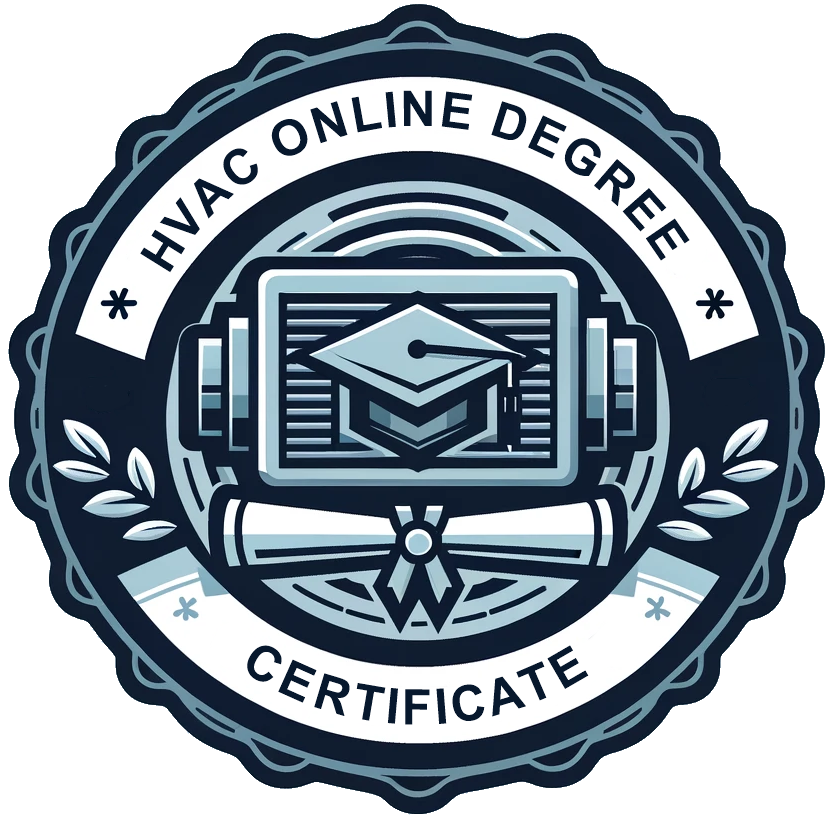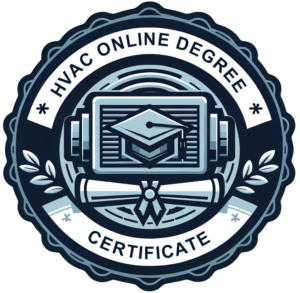Learn how to build an amazing career as an HVAC Technician!
HVAC Online Degree Certificate is here to help you learn everything you need to know about a rewarding career as an HVAC Technician and the best schools to get your degree from.
Why become an HVAC Technician?
Robust Job Market
The HVAC industry is projected to grow by 6% from 2022 to 2032, according to the Bureau of Labor Statistics. This growth is largely driven by the necessity for efficient climate control systems amidst increasing extreme weather events, ensuring a strong demand for skilled HVAC professionals.
Recession Resilience
Throughout economic downturns, including the recent global challenges, the HVAC industry has shown remarkable resilience. The ongoing need for installation, maintenance, and repair of HVAC systems in residential and commercial settings keeps this sector stable and growing.
Competitive Salaries
HVAC professionals enjoy lucrative earnings with a median annual wage of $57,300. Specialized skills in areas such as solar technology and commercial refrigeration can lead to even higher wages, with top earners making over $84,250 annually.
Diverse Educational Paths
Whether it’s through online programs, community colleges, or technical schools, aspiring HVAC technicians have a variety of educational paths to choose from. Our flexible learning options cater to different lifestyles and allow students to learn at their own pace.
Sustainability and Innovation
As the industry moves towards greener technologies, HVAC professionals play a crucial role in implementing systems that reduce energy consumption and carbon footprints. This shift not only helps the environment but also offers technicians a chance to work on the cutting edge of technology.
Hands-on Experience
Our programs emphasize practical skills through hands-on training. This approach ensures that graduates are well-prepared with the necessary competencies to handle real-world challenges in HVAC systems installation, troubleshooting, and maintenance.
States Offering HVAC Programs
Featured Blog Posts
Your Career Pathway
Embarking on a career as an HVAC technician offers diverse educational and training options. The industry is constantly evolving, adhering to stricter regulations, making a thorough education increasingly important. However, for those preferring hands-on learning, apprenticeships remain a viable and rewarding route.

Graduate High School / GED
Start with a solid foundation by excelling in sciences like chemistry and physics during your high school years. This period is also ideal for seeking volunteer or paid opportunities to assist seasoned HVAC technicians, providing early exposure to the field

Accredited HVAC Training
Enroll in a program at a community college, technical school, or other educational institutions offering specialized HVAC training. These programs can range from six months to two years and cover essential topics such as HVAC system design, energy management, and ductwork. Key accrediting bodies such as HVAC Excellence and the Partnership for Air-Conditioning, Heating, Refrigeration Accreditation (PAHRA) ensure the quality and relevance of these programs.

Apprenticeship (Optional)
Gain in-depth, practical experience by entering an apprenticeship, which typically lasts three to five years. You’ll receive around 2,000 hours of on-the-job training each year. Organizations like the Air Conditioning Contractors of America and the U.S. Department of Labor’s ApprenticeshipUSA are notable providers.

Field Experience:
Before pursuing certification, acquiring one to two years of field experience is recommended. Some accelerated or “job-ready” programs might allow you to bypass this step, depending on your previous training and skills.

Certification
Finally, obtain professional certification, which varies by state. Well-regarded certifications in the HVAC industry include those from North American Technician Excellence (NATE) and HVAC Excellence. These credentials demonstrate your expertise and commitment to best practices in HVAC.
FAQ
Frequently Asked
What are the prerequisites for enrolling in an HVAC program?
Most HVAC programs require applicants to have at least a high school diploma or equivalent. Some programs may also require basic knowledge of physics and mathematics, as these subjects are foundational to understanding HVAC systems. It’s beneficial for prospective students to have mechanical aptitude and problem-solving skills.
How long does it typically take to complete an HVAC program?
The duration of HVAC programs varies depending on the type of certification or degree being pursued. Certificate programs can often be completed in as little as six months to a year, while associate degree programs typically take two years. Bachelor’s degree programs in HVAC technology generally require four years of study.
Are there online options available for HVAC training?
Yes, many institutions offer online HVAC training programs that provide flexibility for students who need to balance other commitments. These programs typically cover the same coursework as in-person programs, including fundamentals of HVAC systems, design principles, and maintenance techniques. Online programs are ideal for those who prefer a self-paced learning environment or live far from traditional training centers.
What does accreditation mean for an HVAC program?
Accreditation ensures that HVAC programs meet rigorous standards for quality and compliance with industry and government regulations. Accredited programs must demonstrate excellence in curriculum, faculty, student services, and financial stability.
Why should I choose an accredited HVAC program?
Choosing an accredited program assures you of receiving a quality education that meets specific industry standards, preparing you effectively for your career in HVAC. Accredited programs also provide examinations and certifications that are recognized and respected in the industry.
Which organizations accredit HVAC programs?
Major HVAC accrediting bodies include:
- Partnership for Air-Conditioning, Heating, Refrigeration Accreditation (PAHRA): Develops standards with industry stakeholders and administers competency exams.
- HVAC Excellence: Evaluates programs since 1999 through detailed on-site assessments.
- Distance Education Accrediting Commission (DEAC): Specifically accredits online HVAC programs.
Additionally, regional accreditation can be granted by:
- Higher Learning Commission (HLC)
- Middle States Commission on Higher Education (MSCHE)
- Western Association of Schools and Colleges (WASC)
- Northwest Commission on Colleges and Universities (NWCCU)
- New England Association of Schools and Colleges (NEASC)
- Commission on Colleges for the Southern Association of Colleges and Schools (SACS)
What career opportunities are available after completing an HVAC program?
Graduates of HVAC programs can pursue various roles within the industry, including HVAC technician, system designer, service manager, and sales consultant. Opportunities extend across residential, commercial, and industrial sectors. With additional certifications and experience, some technicians advance into higher management positions or start their own HVAC service businesses.






